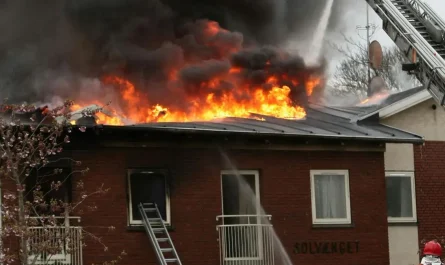Move-In Ready? Not Until You Handle These 5 Must-Do Tasks
I can still clearly recall how happy, anxious, and, to be honest, a little overwhelmed I was the day I received the keys to my first house. Nobody actually tells you what to do as soon as you come through the door; everyone just speaks about furniture and paint colors.
First of all, congrats if you recently purchased a home. Second, it is the moment to concentrate on the things that truly safeguard your house and your tranquility. Until anything goes wrong, those things don’t seem urgent.
This list isn’t nonsense. The majority of homeowners wish they had completed these five crucial maintenance tasks sooner. I’m sharing the lessons I’ve learnt the hard way here to spare you from having to.
Let’s begin with the first, which is likely the most crucial.
1. Secure the House First Locks, Alarms, and Peace of Mind
What did I do as soon as I bought my house? All the locks were changed.
Before you moved in, you had no idea how many neighbors, contractors, real estate agents, and tenants had access to your home. It’s intelligent, not paranoid. That first evening, replace the locks or have them rekeyed. Change any default access codes and configure the app if you plan to use smart locks.
Check all carbon monoxide and smoke detectors immediately after. Just because the prior owners left doesn’t mean they’re still functional. Once, I discovered one without a battery and another that had expired five years prior. Get a fire extinguisher for the kitchen if you don’t already have one. It’s one of those things that you never really need until you do.
Additionally, if your house has a security system, investigate it while you’re at it. If you intend to install one, schedule it before furniture or daily routines interfere, and change any codes that have been left behind.
Pro Tip: According to Homes for Heroes, first-time purchasers cannot compromise on installing alarms or changing locks. Be safe first, then take care of everything else.
This stage is about making a fresh start, taking charge, and getting a good night’s sleep that first night—it’s not about being theatrical.
How about you? Did you trust the previous keys or did you rekey the locks before you moved in?
2. Deep Clean and Handle Pests Before You Settle In
You have a golden window if you haven’t moved your belongings in yet. This is the best—and, to be honest, the only—time to thoroughly clean the entire house without having to maneuver around boxes and furniture.
Start cleaning the areas that are difficult to access later, such as baseboards, carpets, cupboards, behind appliances, and vents. Your definition of clean might differ from the previous owners’, even if they cleaned. I once discovered a whole onion under a refrigerator when I pulled it out. Thank you, but no.
Pests come next. Even though you may not be able to see them yet, they are still present. It’s easier to deal with mice, ants, and roaches before they’ve established themselves. Make a professional-grade do-it-yourself remedy or contact a pest control firm. Additionally, look for old traps, gnaw marks, and traces of droppings, particularly in the attic, basement, and under sinks.
Fact: A thorough pre-move cleaning and early pest control lay the groundwork for a safer and healthier home, according to Better Homes & Gardens.
You only receive this opportunity once. Deep cleaning and tracking out pests are more difficult once furniture and carpets are removed. You’ll thank yourself every time you open a cabinet and discover nothing crawling if you do this now.
What are you going to clean first, or have you already started unpacking?
3. Check the Big Systems Before They Break
The reality is that most significant house repairs take time to complete. They begin as little, silent leaks, blocked gutters, and dusty filters, and they gradually develop into costly issues.
Examining the essential systems that keep your house functioning is therefore your next course of action.
Your HVAC system should come first. Replace the air filters immediately, particularly if you are unsure of when they were last changed. A clogged filter restricts airflow, puts stress on your system, and degrades the quality of your air. It’s also worthwhile to arrange for a professional tune-up if you have central air or heat, particularly prior to seasonal changes.
Next, inspect your gutters and roof. Look for water stains on the interior ceiling, drooping gutters, or missing shingles when you walk around the outside of your home. If water isn’t draining away from the house, even a little gutter blockage might eventually cause damage to the foundation.
If your house has a sump pump, don’t neglect it. Make sure it turns on and drains well after adding a pail of water. You never forget the nightmare of a pump failing during a storm.
Additionally, inspect your visible piping and water heater. Check the base and connections for corrosion, leaks, or rust. Don’t disregard any weird scents, leaking sounds, or slow drains that seem off.
Supported by data: The Zebra reports that homeowners who perform routine maintenance on their plumbing, roof, and HVAC systems save 40% on emergency repairs over a five-year period.
Early completion of these examinations provides you with a baseline in addition to financial savings. You’ll be able to quickly identify any changes because you’ll know what’s typical in your home.
Have you yet to peep in the attic or walk your roofline? This is the moment.
4. Take Care of the Appliances That Quietly Keep You Going
When your appliances are functioning properly, it’s simple to ignore them, but the majority of problems begin with small, invisible problems. In addition to avoiding some major safety hazards, a small routine today can save you hundreds of dollars later.
First, let’s talk about the dryer. Every year, thousands of house fires start from clogged lint buildup. You probably clean the lint trap after every load (hopefully), but the real danger is in the vent that runs behind the dryer and out the wall. Vacuum it out or have it professionally cleaned especially if you notice clothes taking longer to dry.
Then check yourrefrigerator coilsthey re usually on the back or underneath. If they re covered in dust, your fridge is working twice as hard and costing you more in energy. A quick vacuum brush can extend its life. While you re at it, you might want to check which appliances are secretly draining power when not in usehere are 5 you should consider unplugging to cut down your electric bill.
Dishwasheracting funky? Remove the filter and give it a deep clean. Most people never touch it, but old food buildup leads to odor, cloudy glasses, and clogs. It takes ten minutes, and your dishes will thank you.
One smart habit to build right away:flush your drainsonce every couple months with baking soda and vinegar. It s cheap, chemical-free, and keeps gunk from building up in your pipes.
Most of these tasks don t need tools, a plumber, or even more than 30 minutes. But over time? They ll add up to serious savings and fewer Why is this leaking at 2am? moments.
When s the last time you cleaned behind an appliance or have you never dared to look?
5. Walk Your Home Like You re Inspecting It Because You Are
One of the best habits you can build as a homeowner? Walk your house regularly inside and out and actually look at it. I don t mean just glancing at your walls while grabbing coffee. I mean inspecting like it s your job.
Do this once a month: start in one corner of the house and move room to room. Look at ceilings, baseboards, under sinks, corners, windows, outlets. You re checking for cracks, moisture, stains, drafts, or anything that wasn t there before.
Then walk around theoutside. Look at siding, vents, the roofline, gutters, downspouts, foundation. Trim plants away from the walls and check for signs of pests or weather damage. You ll catch early issues like a small crack near the foundation or water pooling in one spot that can turn into expensive repairs if ignored.
Real homeowner insight:OnReddit, dozens of first-time owners said their biggest regret was not spotting mold, rot, or water damage sooner because they weren t looking.
Also, start thinking inseasons. Winterize your pipes, clear leaves in fall, tune up HVAC before summer, check attic vents before spring. A simple quarterly checklist can prevent emergencies. And if you re heading out of town, don t forget to prep your home properlythese 10 devices should be unplugged before any trip to avoid risks and save money. And over time, you ll know your house better than anyone else.
This kind of walkthrough doesn t cost a dime. But it builds the mindset of ownership real ownership where you don t just live in your house. You take care of it before it demands your attention.
How often do you walk your own place with a purpose not just pass through it?
Your House Won t Take Care of Itself But You Can
Buying a home is a big step. If you re still house hunting or considering something brand new, don t miss these10 must-know tips before buying a new construction home. But what really makes it yours isn t the mortgage or the keys it s the way you take care of it. The five things we just covered? They re not chores. They re how you protect your investment, your safety, and your peace of mind.
I ve seen what happens when homeowners wait too long to act. A $20 fix turns into a $2,000 repair. A forgotten alarm battery becomes a near miss. It s not about fear it s about ownership. These small tasks are your first line of defense.
Start simple. Don t try to do everything in a weekend. Pick one thing today. Change a filter. Walk your roofline. Check under the sink.
And if you ve already done a few of these respect. You re ahead of the game.
What s the first maintenance habit you ve added to your homeowner routine? Or which one do you still need to tackle?Drop a comment or share your own tip because real advice from real homeowners helps all of us.
Want more smart tips like these? VisitBuild Like Newfor practical home advice that actually works.
Disclaimer:This article is for informational purposes only and doesn t replace professional advice. Always consult licensed experts for repairs, safety issues, or major home systems.
Table of Contents
-
1. Secure the House First Locks, Alarms, and Peace of Mind
-
2. Deep Clean and Handle Pests Before You Settle In
-
3. Check the Big Systems Before They Break
-
4. Take Care of the Appliances That Quietly Keep You Going
-
5. Walk Your Home Like You re Inspecting It Because You Are
-
Your House Won t Take Care of Itself But You Can




